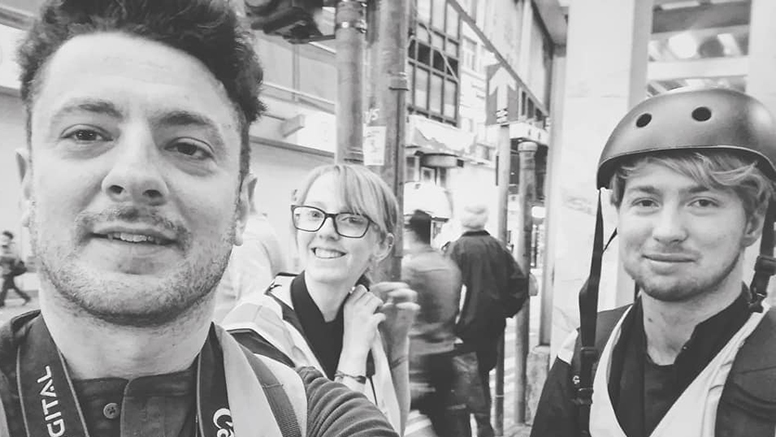Journalists are wishing to leave Hong Kong. What is the exact experience like reporting Hong Kong issues remotely from other countries?

Trine Herold has been planning to be a foreign correspondent in Hong Kong since graduated two years ago. Unfortunately, her plan was being postponed because of the change in press freedom in Hong Kong. This did not stop her from reading the news about what is happening in this city.
Even since the anti-extradition movement in 2019, Herold has followed a huge number of Hong Kong journalist’s accounts on Twitter and established a close relationship with some pro-democracy local journalists to keep being informed of the newest situation in Hong Kong even though she is in Denmark.
With disappointment, Herold said, “What had happened in Hong Kong to journalists no matter to the local or foreign correspondents had stopped my publication sending me there to report.”
After the National Security Law was issued in 2020, journalists working in Hong Kong had expressed their wish to leave Hong Kong to practice the freedom of the press under the intervention of the Chinese government.
While journalists in Hong Kong are wishing to leave the city, a few foreign correspondents still hope to work in this city. Working visa issues have become the biggest barrier for the foreign correspondent to come to Hong Kong.
Herold had discussed with her boss for a long time about the situation of foreign correspondent’s visa issues and press freedom in Hong Kong. Both agreed that the city’s working situation is far beyond their expectation.
“Our understanding of press freedom is journalists can report everything that is happening in a city without being censored no matter it is pro or against the government,” said Herold. “Unfortunately, we cannot see this happens in Hong Kong.”
Hong Kong might not provide the best working environment. Yet, it is a hot topic in the news though journalists are not in the city physically.
Every morning, the first thing that Tommy Walker, a fit with good body shape and cheerful foreign correspondent relocated to Thailand, checks on is the updates of the Hong Kong issue instead of news happen in where he is now located.
In recent years, Thailand and Myanmar have both had serious anti-government protests. These protests end up with clashes between protests and military forces and resulted in a large number of casualties. Comparatively, the situation in Hong Kong received higher awareness from the international than what had happened in these two countries.
“Though the way of government suppressing the press in Thailand or Myanmar are worse than the situation in Hong Kong. The international is still more interested in following the issues in Hong Kong than other cities,” said Walker.
“The dramatic change of government’s attitude towards journalists within two years had shocked many countries as it is not a free government should behave.”
With two years’ working experience in Hong Kong, Walker is asked to be responsible for reporting Hong Kong issues when working in Thailand. Though there is a geographic distance between Hong Kong and Thailand, Walker does not think that working remotely is an issue in reporting the news.
Walker said, “Thanks to the rapid development in technology, I can easily access with different updates from my friend or other reporters in Hong Kong. The only thing that I missed is cannot get the first-hand resources on my own. Other than that, it has provided me a more comfortable environment in writing stories.”
The National Security Law has brought uncertainties to journalists working in Hong Kong. They do not know the definition of broken the law as the authority has the scope to decide it with different standards.
Journalist becomes more conscious and careful when writing the news to avoid infringing on the law. A foreign publication, Bloomberg, in Hong Kong required journalists to let their legal department look through the content before publishing it.
As the Chinese government and the law are being supposed to not have any power to infiltrate the content that is written by journalists outside Hong Kong. A belief is established that foreign correspondent locates in another country can report the news more directly without the concern against the National Security Law.
Indeed, Herold does not think the safety in reporting Hong Kong issues remotely is being guaranteed higher than reporting in that city.
“In terms of physical safety, surely it is safer than working in Hong Kong. However, some traits are showing that the Chinese authority has been scrutinising foreign journalists on social media and pay attention to what we have written,” said Herold.
In the past two years, she found out that there were a couple of users on different social media platforms that kept confronting her works that related to Hong Kong issues. After checking on their names and identities, she discovered these users are mostly Hong Kong police officers or someone from pro-establishment camp.
Recently, a police officer keeps attacking her Twitter content and raises the awareness of pro-government supporters by revealing her identity and working experience.
“I respect people that have a different stand of view from me. I will not stop them from confronting me,” said Herold. “These people are insulting me on social media platforms through infiltrating my privacy. This behaviour has worried me about my safety in Denmark.”
Walker agreed that foreign correspondents reporting outside from Hong Kong receive less awareness from the public have increased their risk of personal safety.
Unlike foreign correspondents working in Hong Kong, that will make lots of headlines and news coverage if the government has suppressed the rights of correspondents. Correspondent reporting outside Hong Kong would not have the same level of attention from the public when being treated unequally by the Chinese authority.
In Denmark, some Chinese authorities were seen in the official foreign conference and video shooting foreign journalists with no explanation.
“It is obvious that people from the Chinese embassy are scrutinizing our movement in reporting and pressure us not to involve much in reporting Hong Kong issues,” said Herold. “The only thing that I concern about is their next step on the foreign correspondent that is responsible for reporting Hong Kong issues.”
Walker did not notice this situation is happening in Thailand, but he is afraid that it would become a common phenomenon in the future. The visa issue problem has already shown that foreign correspondent is becoming a bargaining weapon among international countries.
“It is obvious that the future of foreign correspondents is becoming more challenging no matter where they are located. This does not stop me in responsible for Hong Kong issues,” Walker says. “As a reporter, I feel proud that can be responsible for a story that is full of controversy and arouses the international awareness on it.”
With the Chinese authority began to infiltrate their control into different countries, Herold believes she would not have any chance to report in Hong Kong in the future. Instead, she tried to perform the duties of covering Hong Kong issues in another format to raise Denmark awareness. Every week, she would join a meeting with foreign correspondents in Hong Kong to discuss more the issues there.
“Insult on social media will not stop me in reporting the truth that I am seeing, especially what is happening in Hong Kong to journalist is important to let more people to aware of.”
